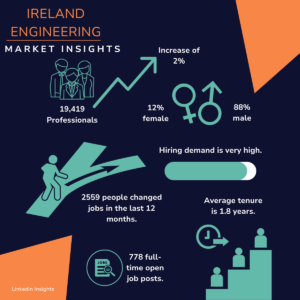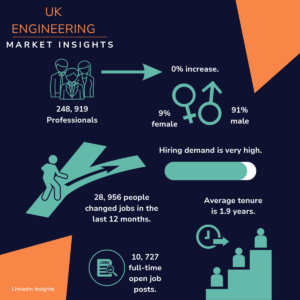Engineering Success: Recruitment Trends in Ireland & the UK
Conscia are producing some ‘snapshot blogs’ providing recruiting trends and insights for different industries and we’re kicking off with the engineering sector. Our first snapshot focuses on Ireland’s engineering talent landscape compared to the UK – HR managers and recruitment professionals in Engineering firms take note.😊


In the past year, while the UK’s engineering sector has seen a steady state, Ireland has experienced a noteworthy growth of 2% in this area.
Despite this difference in growth, both regions continue to see a strong demand for engineering talent. The industry’s dynamism is evident in the numerous job opportunities available, with over 10,000 positions in the UK and around 778 in Ireland. This scenario underscores the importance of a robust recruitment strategy and a clear understanding of your Employee Value Proposition (EVP) to attract and retain the finest engineers.
An interesting point to consider is the average tenure of engineers in both countries. According to LinkedIn research we have accessed, it’s approximately 1.9 years in the UK and 1.8 years in Ireland. This indicates a significant job mobility, with the same research showing that an estimated 28,956 engineers in the UK and 2,559 in Ireland changed jobs last year.
This high turnover rate presents a challenge, emphasizing the need for companies to focus on their EVP to stay competitive and keep skilled professionals on board, and to begin talent pipelining so they’ve got a succession plan in place for those crucial roles!
In summary, both Ireland and the UK present promising opportunities in the engineering sector, with an abundance of job vacancies and a strong demand for engineering expertise.
However, Ireland’s engineering sector has shown growth over the past year, positioning it as a potentially more stable and attractive environment for engineering careers, but providing even greater challenges for employers in talent attraction and retention.
If you want any more information or need some help with your own employer brand or talent pipeline, we’d love to hear from you, reach out to us here!
Share this post






